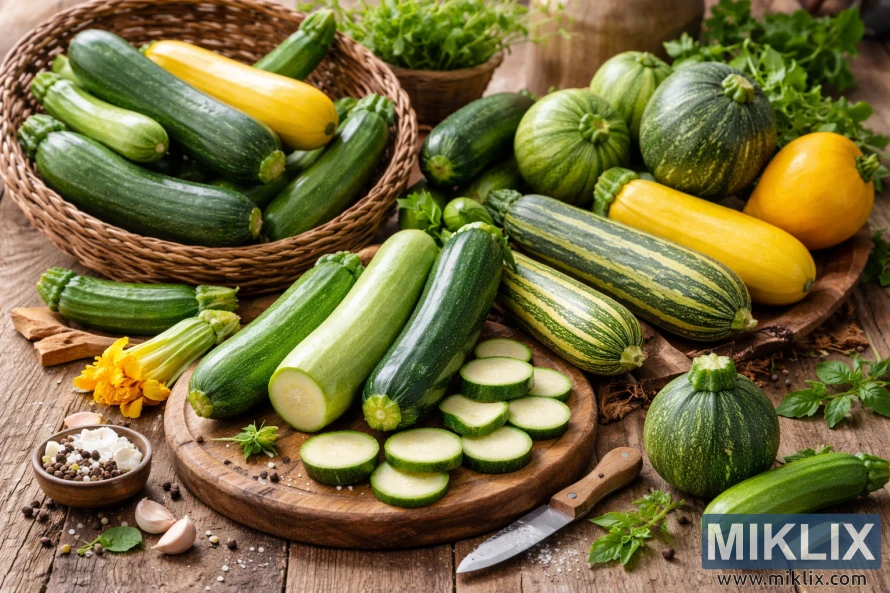Zucchini Power: The Underrated Superfood on Your Plate
Published: May 20, 2025 at 11:07:38 AM UTC
Last updated: December 24, 2025 at 12:56:04 PM UTC
Zucchini (courgettes) are more than just a versatile veggie; they offer a wealth of health benefits. They are low in calories, making them great for weight loss. They are also rich in essential nutrition and antioxidants. Incorporating zucchini courgettes into your diet can lead to improved health outcomes. This includes better digestion and enhanced heart health. Join us as we explore the various advantages of this nutritious vegetable. Discover how to easily add it to your meals.

Key Takeaways
- Zucchini are low in calories and high in nutrition.
- They provide significant health benefits, including antioxidants.
- Incorporating zucchini can support weight loss efforts.
- This vegetable promotes digestive health and heart wellness.
- Zucchini is easy to add to various dishes for enhanced nutrition.
Introduction to Zucchini Courgettes
Zucchini, also known as courgette, is a tasty summer squash from the Cucurbitaceae family. This family also includes melons and cucumbers. Zucchini's history goes back over 10,000 years in the Americas. But, it became popular in Italy in the early 1800s.
At its best, zucchini is picked when it's small. It tastes better and is more nutritious then. It's a favorite in gardens because it grows a lot. Its easy to grow and use in many dishes.
Nutritional Profile of Zucchini
Zucchini is a versatile vegetable known for its impressive nutritional profile. One cup of cooked zucchini, weighing approximately 180g, contains around 27 calories. This makes it a low-calorie option for various dishes.
This nutritious vegetable is packed with essential vitamins and minerals, including:
- Vitamin C: Provides about 26% of the daily value (DV)
- Vitamin A: Delivers approximately 11% of the DV
- Manganese: Contains about 14% of the DV
- Potassium: Offers roughly 10% of the DV
- Magnesium: Supplies approximately 8% of the DV
The combination of these vitamins and minerals in zucchini contributes significantly to overall health. With low calories and high fiber content of 2g per cup, zucchini stands out as an excellent addition to any healthy diet.
High in Antioxidants
Zucchini is packed with health benefits, thanks to its antioxidants. These compounds, like lutein and beta-carotene, fight free radicals. This helps protect cells and may reduce the risk of chronic diseases.
Studies show that zucchini's antioxidants are great for the eyes, skin, and heart. The skin of zucchini has the most antioxidants. Yellow zucchini has even more than light green ones, making it extra protective.
Eating zucchini is a tasty way to get these health benefits. It can help keep you healthy and may lower cancer risks, like prostate cancer. Adding zucchini to your meals makes your food delicious and nutritious.

Contributes to Healthy Digestion
Zucchini is packed with both soluble and insoluble fiber. This fiber is key for a healthy digestive system. The insoluble fiber makes stools softer and bulkier, which helps prevent constipation.
Regularly eating zucchini can boost your gut health. It's a tasty way to improve digestion and overall gut health.
The soluble fiber in zucchini helps good bacteria grow in your gut. These bacteria make short-chain fatty acids. These acids feed the gut lining and may reduce inflammation from conditions like IBS or Crohn's disease.
May Help Lower Blood Sugar Levels
Zucchini is great for those trying to control blood sugar, like people with type 2 diabetes. It has very few carbs, making it a better choice than foods with more carbs. This helps keep blood sugar steady.
Zucchini is also packed with fiber. Fiber slows down how sugars are absorbed into the blood. This prevents blood sugar from rising too fast after eating. So, zucchini is good for managing diabetes.
Studies have found that zucchini peel extract might help lower blood sugar and insulin levels. Adding zucchini to your meals can be very beneficial for controlling blood sugar.
May Improve Heart Health
Zucchini is good for your heart in many ways. It's full of fiber, which helps lower bad cholesterol. This is key to avoiding heart diseases.
Zucchini also has potassium, which helps control blood pressure. This is good for your heart's health.
The carotenoids in zucchini are antioxidants. They fight oxidative stress and improve blood vessel health. Studies show eating more fiber, like from zucchini, can lower heart disease risk.
Zucchini is not only tasty but also great for your heart. Adding it to your meals can be very beneficial.
Promotes Eye Health
Zucchini is full of nutrients that help your eyes. It has carotenoids like lutein and zeaxanthin. These help protect your eyes from harmful light.
These carotenoids also act as antioxidants. They protect the retinal cells from damage caused by oxidative stress.
Zucchini also has vitamin C and beta-carotene. These nutrients boost eye health even more. Eating zucchini regularly can lower the risk of macular degeneration.
This condition can cause serious vision loss. So, it's important to eat foods rich in these nutrients.
Supports Weight Loss Efforts
Zucchini is great for those trying to lose weight because it's low in calories. It has a lot of water, which makes you feel full without adding too many calories. Eating zucchini can help you feel satisfied, making it easier to control your appetite.
Zucchini is also packed with dietary fiber, which helps with weight control. Foods high in fiber are more filling, which can stop you from eating too much. Many studies show that eating more vegetables, like zucchini, can help you lose weight. By using zucchini instead of high-calorie foods, you can eat fewer calories and get more nutrients, helping you lose weight.

Potential Anti-Cancer Properties
Research shows that zucchini extracts might fight cancer. They can slow down the growth of some cancer cells. This makes zucchini a key food in fighting cancer.
Zucchini is full of antioxidants. These help fight oxidative stress, which can lead to cancer. Eating zucchini regularly can boost your health and help prevent cancer.
May Strengthen Bone Health
Zucchini courgettes are packed with nutrients good for bones, like vitamin K and magnesium. Vitamin K is key in bone health, helping keep calcium in bones. It also helps make osteocalcin, a protein that keeps calcium in bones, making them denser.
Magnesium is also vital for strong bones. It works with vitamin K to keep bones strong and prevent fractures. Eating enough magnesium helps control calcium levels, keeping bones strong and flexible.
Eating zucchini can make your meals more nutritious. Adding foods rich in vitamin K and magnesium to your diet helps keep bones healthy. This approach supports strong bones and overall skeletal health.
Zucchini Courgettes and Thyroid Function
Research into zucchini and thyroid health is quite interesting. Early studies on animals show that zucchini peel extracts might help keep thyroid hormone levels steady. This could mean zucchini extracts play a role in hormone regulation, helping those with thyroid problems.
But, we need more studies on humans to really grasp how zucchini affects thyroid function. As people become more interested in zucchini's health benefits, it's key to look at thyroid health and hormonal balance as a whole.
Easy Ways to Incorporate Zucchini into Your Diet
Zucchini is a great choice for anyone looking to add variety to their meals. It's perfect for meal prep and can be enjoyed in many ways. This makes it easy to include in your daily diet.

Raw zucchini adds a nice crunch to salads. Its mild taste goes well with many ingredients, improving both flavor and texture. You can also blend it into soups for a creamy, nutritious option.
Try stuffing zucchini with rice and veggies for a tasty dish. Or, spiralize it to make a healthy noodle substitute. These ideas are great for any zucchini recipe.
- Baking zucchini brings out its natural sweetness, perfect for side dishes or healthy snacks.
- Sautéing adds a bit of char and depth to the flavor, perfect for quick weeknight dinners.
- Grilling enhances its taste further, making zucchini a wonderful addition to summer cookouts.
With so many options, adding zucchini to your meals can make your diet more interesting. It helps you stay healthy while enjoying different flavors.
Historical Context of Zucchini Consumption
Zucchini has a long history that spans centuries and continents. It first grew wild in the Americas. Later, Italian cooks in the 1600s fell in love with it, making it popular in many dishes.
The term "zucchini" became known in the early 1900s. It shows how it became part of English-speaking cooking. Zucchini can be used in many ways, like sautéing, grilling, or in soups and baked goods.
Today's zucchini varieties come from ancient seeds. This shows its important role in both home cooking and fancy dining. It connects us to a long tradition of enjoying and nourishing food.
Common Allergies and Health Considerations
Zucchini is known for its health benefits, but some people may have allergies to it. Symptoms can include nausea, itching, or breathing problems after eating it. These reactions are rare but serious and should be taken seriously.
Eating too much zucchini can also cause stomach problems. This is because of compounds like cucurbitacin. It can lead to discomfort, bloating, or gas. It's important to watch how much zucchini you eat, if you have a sensitive stomach.
If you're new to zucchini, start with small amounts. This helps your body get used to it without problems. Cooking zucchini can also help with stomach issues, making it better for those who easily get upset stomachs.
Where to Buy and How to Store Zucchini
Buying zucchini is simple. You can find it at grocery stores and farmers' markets. Look for firm, shiny zucchini to ensure it's fresh. Avoid soft or blemished zucchini for the best quality.
To keep zucchini fresh, store it in a plastic bag in the fridge. This method keeps it fresh for up to a week. If you buy a lot, freezing is a good option. Frozen zucchini lasts up to three months. Make sure to wash and slice it before freezing for easy use later.
Using the right storage methods keeps zucchini fresh longer. It also reduces waste, so you can enjoy this healthy veggie for more time.
Conclusion
Adding zucchini courgettes to your meals can greatly improve your health. This food is low in calories but packed with vitamins and minerals. It's perfect for those looking to eat better.
Zucchini helps with digestion and keeps your heart healthy. It's also easy to add to many dishes, like sautéed, grilled, or in smoothies. This makes it a great choice for a healthy diet.
Looking to boost your nutrition? Zucchini courgettes are a great choice. They're simple to use and offer many health benefits. Adding them to your meals can lead to better health and energy every day.

Further Reading
If you enjoyed this post, you may also like these suggestions:
- A Round-Up of the Most Beneficial Food Supplements
- A Round-Up of the Most Healthy and Nutritious Foods
- Slim, Green, and Full of Power: The Health Benefits of Leeks
